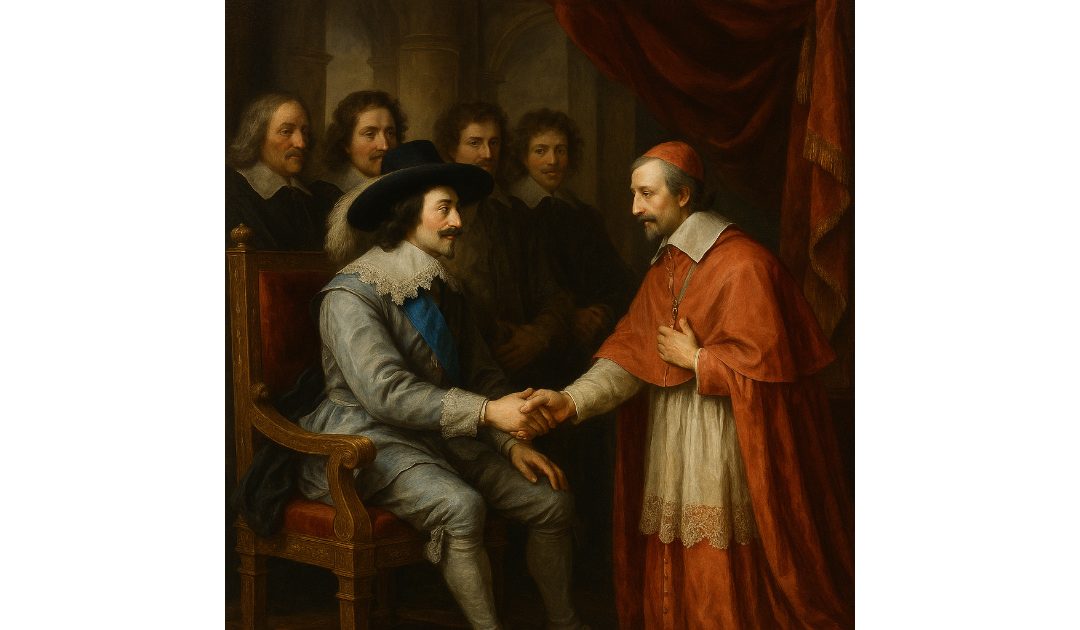On the 13th of August, 1624, King Louis XIII appointed Cardinal Richelieu as his prime minister. I have written about Richelieu before, and he is a character in my work in progress, the fifth book in the Sir Anthony Standen Adventures.
Armand Jean du Plessis, better known as Cardinal Richelieu, was a towering figure in 17th-century France, leaving an indelible mark on both the historical and literary landscapes. Born in 1585 into a family of minor nobility, Richelieu rose to prominence through his shrewd political acumen, becoming Chief Minister to King Louis XIII. His tenure from 1624 until his death in 1642 was characterised by efforts to consolidate royal power and strengthen France’s position on the European stage.
Historical Influence:
Richelieu’s political career was defined by his relentless pursuit of state centralisation and the diminishment of feudal power. His primary goal was to transform France into a strong, unified nation-state under the absolute authority of the monarchy. This vision led him to suppress the political rights of the Huguenots (French Protestants), although he maintained their religious freedoms granted by the Edict of Nantes.
Internationally, Richelieu orchestrated France’s involvement in the Thirty Years’ War, shifting alliances pragmatically to counter Habsburg dominance in Europe. His diplomatic manoeuvres advanced France’s influence, paving the way for the later reign of Louis XIV. Richelieu also established the Académie Française in 1635, underscoring his commitment to shaping French culture and language.
Despite his austere persona, Richelieu was a patron of the arts and letters. His political reforms, however, often painted him as a ruthless, Machiavellian figure, willing to employ espionage, suppression, and intrigue to achieve his goals. His ‘Red Eminence’ moniker reflected both his cardinal’s robes and his formidable presence in court politics.
Richelieu in Fiction:
Cardinal Richelieu’s historical prominence naturally lent itself to literary adaptation, most famously in Alexandre Dumas’ novel The Three Musketeers. In this swashbuckling tale, Richelieu is portrayed as a cunning antagonist, wielding power behind the throne with manipulative finesse. Dumas amplifies Richelieu’s historical reputation for scheming, casting him as a master of intrigue, orchestrating plots to undermine Queen Anne and challenge the heroism of d’Artagnan and the Musketeers.
While Dumas’ depiction is fictionalised, it taps into the enduring image of Richelieu as a symbol of political manipulation and authoritarian control. This literary portrayal has influenced countless adaptations in film, television, and theatre, where Richelieu often emerges as the archetype of the shadowy power broker.
Moreover, Richelieu’s character has transcended Dumas’ work. He appears in other fictional contexts, often embodying the traits of ambition, strategic genius, and moral ambiguity. His representation reflects broader themes of the struggle between personal loyalty and statecraft, individual ambition versus collective good.
Bridging History and Fiction:
The contrast between the historical Richelieu and his fictional counterparts reveals much about how history is interpreted through cultural narratives. Historically, Richelieu’s contributions to statecraft and diplomacy are undeniable. He was a visionary leader with a pragmatic approach to governance, prioritising national unity and strength over personal sentiment.
In fiction, however, Richelieu becomes a canvas for exploring the darker facets of power. His association with intrigue and manipulation makes him an ideal antagonist in stories where heroism and virtue clash with deception and control. This duality enriches his legacy, offering a complex figure who embodies both the potential for greatness and the perils of unchecked authority.
Ultimately, Cardinal Richelieu’s life and legend illustrate the interplay between historical fact and literary imagination. Whether viewed through the lens of history or fiction, he remains a compelling figure whose influence resonates across centuries.

